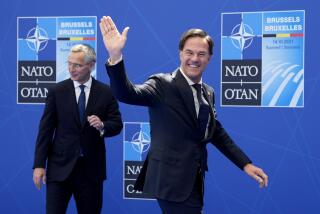Peace Envoy Bildt to Lead Civilian Effort in Bosnia
- Share via
LONDON — His admirers handed former Swedish Prime Minister Carl Bildt the hottest potato in Europe on Friday, choosing him to lead an ambitious international attempt to reconstruct Bosnia-Herzegovina.
The 46-year-old Bildt was the unanimous choice of a conference here implementing last month’s Dayton, Ohio, peace accord, but his appointment as proconsul came with only vague descriptions of his powers. Americans see him as a coordinator; the polyglot Bildt, with European support, believes that he will also prove a policymaker in the tough months ahead.
Bildt, whose title is High Representative, will oversee key civilian issues such as human rights, refugees, police, relief, economic reconstruction and election planning.
“The responsibility for putting these strands together within Bosnia will fall on the High Representative,” said British Prime Minister John Major, a leading European supporter of Bildt in the role of decision maker. “It is a task which will require exceptional energy and proven qualities of leadership.”
The fast-talking Bildt, who nevertheless has the reputation of being a patient negotiator, told reporters that in addressing “a vast and extremely complicated agenda,” he will monitor compliance with the peace pact, coordinate civilian relief efforts and ensure smooth civilian-military relations.
How Bildt’s civilian tasks will mesh with the North Atlantic Treaty Organization’s military command structure is unknown. U.S. officials want the military commanders in Bosnia to enforce the peace without civilian interference of the sort that has bedeviled U.N. peacekeepers.
“The principal purpose of the conference is to decide the management structure,” said J. Brian Atwood, the director of the Agency for International Development and a member of the U.S. delegation to the conference.
Bildt, he said, will coordinate the complex attempt by international relief agencies to begin reconstruction and launch a free-market economy in a country shattered by 3 1/2 years of ethnic warfare.
*
“The military will be responsible for security. It will have no police or nation-building role,” Atwood said, reiterating the U.S. position that Bildt must not make decisions on military matters.
However Bildt’s role is shaped, there is a consensus that he is, as Major called him, “superbly qualified” for the task.
Bildt, who is fluent in English, French and German, has served since June as the European Union’s frustrated peacemaker in Bosnia, his role largely overtaken by U.S. peace efforts that led to the Dayton accords.
Bildt, a once and potential future prime minister, led Swedish conservatives to power in 1991 after six decades in opposition. He was voted out in 1994.
Bosnian Foreign Minister Muhamed Sacirbey wished Bildt a successful term “but, frankly, also a quick one. We want to take these responsibilities ourselves--and the sooner the better,” he told reporters here Friday.
Opening the two-day London Peace Implementation Conference on Friday, Major applauded the end of a war he said has claimed 200,000 lives and created more than 2 million refugees.
“Our task, today and tomorrow, is to make sure that the guns remain silent, that the Dayton accords are put into effect, that the war does not resume through any error or omission on our part.”
Major told delegates from more than 50 countries and international agencies that an orchestrated and sustained international commitment must ensure that the paper accord becomes fact.
“Peace in Bosnia cannot fail. We cannot allow the nightmare of the past three years to return. In our commitment to a powerful implementation force and a huge civilian effort, we must make it unthinkable for anyone to drag Bosnia back to the edge of the abyss.”
*
With the Office of the U.N. High Commissioner for Refugees as the lead relief agency, troops and civilians will pour into Bosnia after the formal signing of the Dayton agreement next week in Paris.
“In the early days, our greatest concern will be getting [refugees] home and getting the economy up and running,” Atwood said Friday.
Initial relief efforts designed to have a quick impact would focus on rehabilitation, resettlement, health and education, and repairing the physical trauma of war.
Thus, early programs will range from reconstruction of damaged roads, houses, schools and health centers to the inoculation of children to psychological aid for people shaken by war. “We must give people a stake in peace,” Atwood said.
In the weeks since the signing of the Dayton agreement, U.S. and European officials have been wrangling over several unresolved issues, among them who will hold what jobs in the civilian effort.
France--irked that most of the credit for making the peace has gone to the Americans--has been pressing to have European officials given more of the top jobs on the civilian side. (The French have also said that the peace treaty--sorry, Dayton--will be known to history as the Elysee Accord.)
U.S. officials have wanted as many as possible of the top civilian officials to work directly in Sarajevo, the capital, and other Bosnian cities. But European officials have suggested that the operation be based or controlled from a city outside Bosnia, such as Geneva.
And, finally, American and European officials are also still at odds over money. The World Bank estimates that it will cost $6 billion for reconstruction in Bosnia over the next five years.
International financial agencies are expected to pay about half of this sum, with the other $3 billion to be raised through contributions from individual countries.
European governments have suggested that they should pay up to $2 billion and that the United States should contribute $1 billion. But the Clinton administration has balked, saying it can come up with no more than $600 million.
More to Read
Sign up for Essential California
The most important California stories and recommendations in your inbox every morning.
You may occasionally receive promotional content from the Los Angeles Times.













